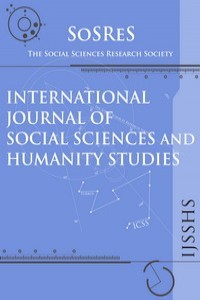RETHINKING THE THIRD WORLD: A CONCEPTUAL FRAMEWORK TO UNDERSTAND CHANGE AND CONTINUITY IN THE THIRD WORLD
RETHINKING THE THIRD WORLD: A CONCEPTUAL FRAMEWORK TO UNDERSTAND CHANGE AND CONTINUITY IN THE THIRD WORLD
The Third World, Conceptualizing the Third World International Relations Theory and the Third World,
___
- Ayoob, Mohammed (2002), “Inequality and Theorizing in International Relations: the Case for Subaltern Realism”, International Studies Review, Vol. 4, No. 3, pp.27-48.
- Ayoob, Mohammed (1995), The Third World Security Predicament: State Making, Regional Conflict, and the International System, London: Lynne Rienner Publishers.
- Berger, Mark T. (1994), “The End of the ‘Third World’?”, Third World Quarterly, Vol. 15, No. 2, pp.257-275.
- Blight, James G. and Thomas G. Weiss (1992), “Must the Grass Still Suffer? Some Thoughts on Third World Conflicts after the Cold War”, Third World Quarterly, Vol. 13, No. 2, pp.229-248.
- Brown, Chris (2000), “The Modern Requirement? Reflections on normative international theory in a post-Western world”, (in: Andrew Linklater-Ed, International Relations Critical Concepts Vol.V,), London: Routledge, pp.2079-2089.
- Buzan, Barry (1998), “Conclusions: System versus Units in Theorizing about the Third World”, (in: Stephanie G. Neuman-Ed., International Relations Theory and the Third World), New York: St. Martin’s Press, pp.213-230.
- Cox, Robert (1999), “Civil Society at the Turn of the Millennium: Prospects for an Alternative World Order”, Review of International Studies, Vol. 25, No. 1, pp.3-28.
- Fawcett, Louise and Yezid Sayigh (1999), “Introduction”, (in: Louise Fawcett and Yezid Sayigh-Eds., The Third World beyond the Cold War,), Oxford: Oxford University Press, pp.1-11.
- Fawcett, Louise (1999), “Conclusion: Whither the Third World?”, (in: Louise Fawcett and Yezid Sayigh-Eds., The Third World beyond the Cold War,), Oxford: Oxford University Press, pp.234-246.
- Holm, Hans-Henrik (1990), “The End of the Third World?”, Journal of Peace Research, Vol. 27, No. 1, pp.1-7.
- Hurrell, Andrew (1999), “Security and Inequality”, (in: Andrew Hurrell and, Ngaire Woods-Eds, Inequality, Globalization and World Politics,) Oxford: Oxford University Press, pp.248-271.
- Randall, Vicky (1992), “Third World: Rejected or rediscovered?”, Third World Quarterly, Vol.13, No.4, pp.727-730.
- Smith, Steve (2004), “Singing our World into Existence: International Relations Theory and September 11”, International Studies Quarterly, Vol. 48, No. 3, pp.499-515.
- Tabah, Leon (1991), “Alfred Sauvy: Statistician, Economist, Demographer and Iconoclast (1898-1990)”, Population Studies, Vol. 45, No. 2, pp.353-357.
- Thomas, Caroline (1999), “Where is the Third World Now?”, Review of International Studies, Vol:25, No:5, pp.225-244.
- Ulack, Chris (2011), “The Arab Spring’s looming refugee crisis”, Foreign Policy, http://mideast.foreignpolicy.com/posts/2011/06/23/the_arab_spring_s_looming_refugee_
- crisis, [Accessed 20.03.2012]
- Başlangıç: 2009
- Yayıncı: Sosyal Bilimler Araştırmaları Derneği
SARTRE’S CONCEPTION OF ART GROUNDED ON HUMANIST EXISTENTIALISM AND PHENOMENOLOGICAL ONTOLOGY
THE CONCEPT OF PROFESSIONAL IN THE NEW CIVIL CODE
Narcisa Mihaela STOİCU, Sorin FİLDAN
THE CAUSES AND THE ECONOMIC IMPACT OF IMMIGRATION: EMPIRICAL EVIDENCE FOR LITHUANIA
Gindra Kasnauskiene, Juratė Seskaite
THE DISABLED AND THEIR EVERYDAY LIFE EXPERINCES IN IRANIAN CULTURE
Hamid Ebadollahi CHANZANAGH, Akbar PİRİ, Elham Abbaszadeh GARJAN
GEOPOLITICS OF CASPIAN OIL AND GAS
YOUNG PEOPLE’S ATTITUDES TOWARDS ENTREPRENEURSHIP IN FINNISH SOCIETY
